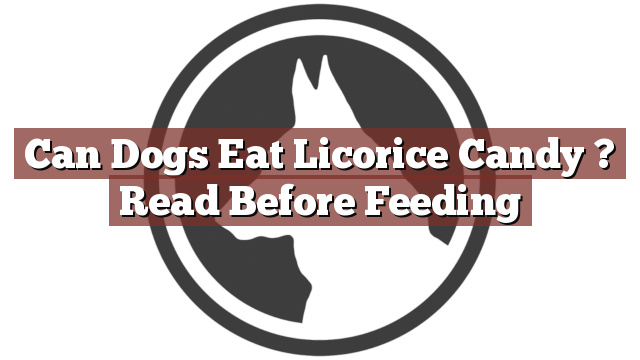Understanding Your Dog’s Dietary Needs
As responsible pet owners, it is crucial to understand our dogs’ dietary needs in order to provide them with proper nutrition. While dogs are primarily omnivores, their digestive systems are not designed to process certain foods that humans consume. It is important to be aware of potential harmful ingredients in our food and treats before sharing them with our furry friends.
Can Dogs Eat Licorice Candy? Read Before Feeding
Can dogs eat licorice candy? It is important to note that no, dogs should not consume licorice candy. Licorice candy contains an ingredient called glycyrrhizin, which is derived from the licorice root. Glycyrrhizin can be harmful to dogs if ingested in large quantities. This compound can lead to an increase in blood pressure and cause potassium levels to drop dangerously low. Additionally, licorice candy often contains high levels of sugar and artificial sweeteners, which can lead to digestive issues and obesity in dogs.
Pros and Cons of Feeding Licorice Candy to Dogs
While there may be certain benefits associated with licorice for humans, it is important to consider the potential risks when it comes to feeding licorice candy to dogs. Licorice has been known to possess anti-inflammatory properties and may help soothe certain digestive issues in humans. However, these benefits do not extend to our furry companions. The risks of licorice candy outweigh any potential benefits for dogs.
Feeding licorice candy to dogs can result in serious health complications. Dogs that consume large quantities of licorice candy may experience symptoms such as increased thirst, lethargy, muscle weakness, and even heart irregularities. It is crucial to keep all forms of licorice candy, including black licorice, licorice root extract, and licorice-flavored treats, out of reach of our canine friends.
Conclusion: Exercise Caution and Consult a Veterinarian
In conclusion, it is important to exercise caution when considering sharing any human food or treats with dogs. While licorice candy may be a delightful treat for us, it is not safe for dogs. The potential risks of glycyrrhizin, high sugar content, and artificial sweeteners make licorice candy unsuitable for canine consumption. If you suspect that your dog has consumed licorice candy, it is recommended to contact your veterinarian immediately for guidance. Remember, responsible pet ownership includes understanding your dog’s dietary needs and providing them with appropriate and safe nutrition.
Thank you for taking the time to read through our exploration of [page_title]. As every dog lover knows, our furry friends have unique dietary needs and responses, often varying from one canine to another. This is why it's paramount to approach any changes in their diet with caution and knowledge.
Before introducing any new treats or making alterations to your dog's diet based on our insights, it's crucial to consult with a veterinarian about [page_title]. Their expertise ensures that the choices you make are well-suited to your particular pet's health and well-being.
Even seemingly harmless foods can sometimes lead to allergic reactions or digestive issues, which is why monitoring your dog after introducing any new food item is essential.
The content provided here on [page_title] is crafted with care, thorough research, and a genuine love for dogs. Nevertheless, it serves as a general guideline and should not be considered a substitute for professional veterinary advice.
Always prioritize the expert insights of your veterinarian, and remember that the health and happiness of your furry companion come first.
May your journey with your pet continue to be filled with joy, love, and safe culinary adventures. Happy reading, and even happier snacking for your canine friend!

